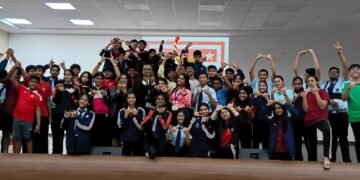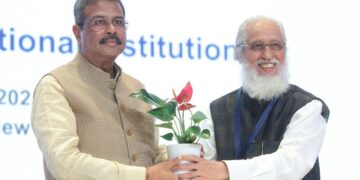
Post-pandemic, the business world is evolving towards an ‘employee centric’ mindset. Organizations are recognizing that employee-engagement and employee-delight is paramount, and is possibly the only way which leads to customer-centricity and customer-delight. Employee being the most valuable asset, is becoming louder, both in words and deeds!
The agenda of transforming the organizational skill-sets and ‘employee mindset’ lies at the epi-centre of organizational transformations! This is now driving companies to spend more on employees, their mental and physical well-being, their upskilling and enhancing their professional capabilities. All of such employee-centric initiatives are not only likely to earn their trust and get them emotionally engaged with the organization, but also positions ‘upskilled’ employees as a key source of competitive advantage!
Many organizations are spending disproportionately high towards reskilling their workforce, across hierarchies, as customer needs are changing, technology opening up newer horizons and competitor response becoming aggressive. Key desired competencies are being defined with varying proficiency levels that managers across hierarchies need to absorb. The need to choose entry-level employees with the right mix of knowledge, skill-sets and behaviour, and the desired competencies, has become more important than ever before!
In order to be successful, business schools need to appreciate three vital complementarities with today’s evolving industry dynamics. The curricula of the business school need to deliver a perfect blend of ‘knowledge, skillsets and behaviour’ overarching and encompassing these three vital competency based ‘themes’; let’s see what these three ‘themes’ are?
First, strategic orientation and integrative thinking. This is primarily anchored on the customer, and competition, and it synthesizes the choice of resource allocation that will rightly balance and maximize ‘value creation’ to all stakeholders, given the market trends and technology evolution. It is a crucial skill-set that encompass critical thinking, dealing with uncertainty, problem solving, understanding and managing risk. Articulation and communication skills is a vital component less focused for long in the academic curricula. Especially in a complex world marred with uncertainties, strategic orientation is a key trait to be absorbed!
Although senior managers in organizations having ‘expert proficiency’ in the area of strategic orientation evolve strategies and business models, entry level managers need to acquire ‘basic’ and ‘working level’ proficiency in this area to effectively contribute to the organization’s objectives and transformation. ‘Strategic orientation’ can be effectively taught in B-schools using case studies, role plays, workshops and experiential learning like using simulations and should be an essential component of the curricula.
Second, data analytics and digital capabilities. Biggest on the transformation agenda of organizations is becoming better ‘digitally’ than competition in order to gain deeper customer insights and be able to deliver digitally integrated solutions. Digital upskilling of both legacy employees and millennials is the front runner, and happens to be the most challenging bottleneck organizations are facing in their transformation journey, today. Given this backdrop, organization want incoming managers to be data science ‘appreciative’ and digitally ‘proficient’; programming skills that lead to robotic process automation, artificial intelligence, machine learning and prescriptive analytics are no more luxuries, but are basic necessities and hygiene factors.
Business schools need to not only teach the science of data, statistics and associated theoretical elements, but also how such ‘digital’ capabilities can be leveraged by organizations in their functional domains like marketing, finance, operations, human resources and strategy decisions thereby impacting the stakeholders. The B-school needs to deliver a functionally integrated ‘working and expert’ level proficiency in this area; the curricula needs to factor this!
Third, empathy and people skills; a largely neglected area in the B-school curricula today. It entails ability to see from other’s perspectives. In today’s business world managers are expected to hit the ground running, taking on responsibilities and delivering outcomes working along with small to medium sized teams. Leadership roles, or for that matter even being part of a large team, demand high levels of emotional stability, an awareness of the importance of empathy, people skills and the ability to work along with teams, and where ever possible to understand the nuances underlying such dynamics!
Over the years, business school curricula have evolved to be strong on the ‘knowledge’ component; areas that form the core of functional specializations encompassing economics, marketing, finance, operations human resources and organizational development. The ‘skill’ and ‘behavioural’ themes need more focus and B-schools need to equip outgoing student with such skill-sets and behavioural traits, as they transition out to the industry!
Co-creation of the curricula will be the solution! Business schools that can work very closely around the ‘recruiter agenda’, their transformation plans and becoming the extend arm of the recruiter’s ‘learning and development’ teams, will be the ones that can provide industry ready managers; active and carefully chosen ‘academic boards’ with eminent industry experts and stakeholders can infuse the required contemporariness.
Potential recruiters and business schools can identify customized internships and joint research projects for identified students. While the basic ‘academic core’ of the curricula will be evolved by the business school based on its stringent global benchmarking preserving the ‘academic rigor’, recruiters can provide value added guidance in the choice of specialized electives and can also participate with academic institutions in delivering the same.













